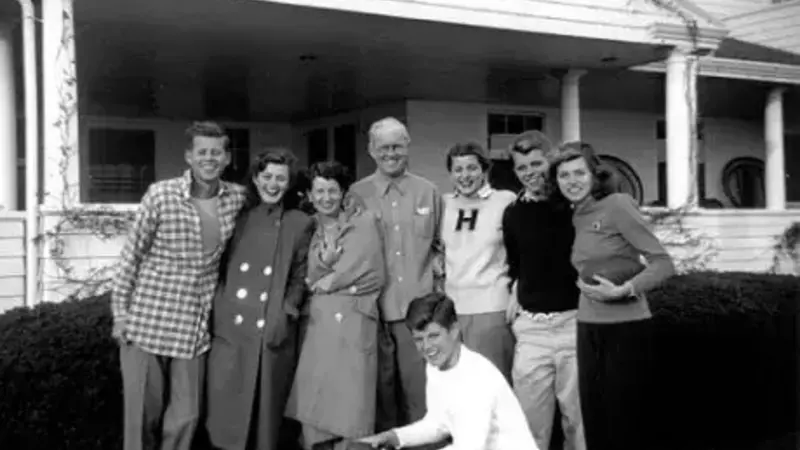The Kennedy family has long been synonymous with American politics and philanthropy, but few stories capture their legacy like that of Eunice Kennedy Shriver siblings. Eunice, known for founding the Special Olympics, was one of nine siblings who each played pivotal roles in shaping history. From the charismatic leadership of John F. Kennedy to the influential advocacy of Robert F. Kennedy, each sibling left a unique mark on society.
The family’s commitment to public service is evident in their collective achievements, with Joseph P. Kennedy Jr. making the ultimate sacrifice in World War II and Jean Kennedy Smith serving as the U.S. Ambassador to Ireland. This article delves into the lives and contributions of Eunice’s siblings, exploring how their shared values of compassion, resilience, and social change continue to inspire future generations. Join us as we uncover the remarkable legacy of the Kennedy family.
Table of Contents
ToggleThe Kennedy Family Legacy
The Kennedy family deeply roots its legacy in politics, public service, and philanthropy. Eunice Kennedy Shriver’s siblings were a part of this legacy, with many of them becoming influential figures in government and civil rights. They shared a strong commitment to social change, following the footsteps of their father, Joseph P. Kennedy Sr., and their mother, Rose Fitzgerald Kennedy.
The Nine Kennedy Siblings
Eunice Kennedy Shriver was one of nine children born to Joseph P. Kennedy Sr. and Rose Fitzgerald Kennedy. The nine siblings grew up in an environment that fostered a sense of responsibility, ambition, and dedication to public service.
1. Joseph P. Kennedy Jr. (1915–1944)
Joseph P. Kennedy Jr., the eldest of the Kennedy siblings, was groomed by his father to enter politics and one day run for the presidency. A Harvard graduate and Navy pilot, he served in World War II. Tragically, he was killed in action in 1944 during a mission over Europe. His death had a profound impact on the family, shifting the political ambitions toward his younger brother, John.
Joseph was known for his leadership qualities and strong sense of duty. His aspirations and sacrifices set the stage for his siblings, particularly John and Robert, who would take up the mantle of public service and leadership in the years to come.
2. John F. Kennedy (1917–1963)
Perhaps the most famous of the Kennedy siblings, John F. Kennedy, also known as “Jack,” became the 35th President of the United States. Elected in 1960, JFK’s presidency is remembered for the Cuban Missile Crisis, the establishment of the Peace Corps, and his commitment to civil rights. His assassination in 1963 shocked the nation and solidified the Kennedy family’s place in American history. JFK’s leadership, charisma, and vision for a “New Frontier” still resonate today.
John’s presidency marked a pivotal era in American history, characterized by significant social change and the Cold War’s tensions. His famous inaugural address, which included the iconic line, “Ask not what your country can do for you—ask what you can do for your country,” continues to inspire generations.
3. Rosemary Kennedy (1918–2005)
Rosemary Kennedy, the third child, faced intellectual challenges that were not fully understood at the time. In a controversial decision, she underwent a lobotomy at the age of 23, which severely impacted her mental and physical abilities. Her experience had a lasting influence on her siblings, particularly Eunice Kennedy Shriver, who dedicated much of her life to advocating for people with intellectual disabilities, eventually founding the Special Olympics in Rosemary’s honor.
Despite the challenges she faced, Rosemary became a symbol of resilience. The family’s commitment to her well-being highlighted the importance of understanding and advocating for individuals with disabilities, laying the groundwork for future reforms.
4. Kathleen Kennedy Cavendish (1920–1948)
Kathleen Kennedy, known as “Kick,” was known for her vibrant personality and beauty. She married William Cavendish, the Marquess of Hartington, becoming Marchioness of Hartington. Sadly, her life was cut short when she died in a plane crash in 1948. Despite her short life, Kathleen’s spirit of adventure and independence left a lasting impression on her family.
Kathleen gained recognition for her love of life and strong connections with her family. Her marriage into British nobility and her tragic death drew media attention and further cemented the Kennedy family’s prominence.
5. Eunice Kennedy Shriver (1921–2009)
Eunice Kennedy Shriver carved out a unique legacy as a champion for individuals with disabilities. Her work led to the founding of the Special Olympics, an international organization that provides sports training and competitions for people with intellectual disabilities. Inspired by her sister Rosemary’s challenges, Eunice’s contributions to the disability rights movement are among the most important aspects of the Kennedy family legacy.
Eunice’s passion for social justice extended beyond the Special Olympics. She also advocated for civil rights, women’s rights, and healthcare reform. Her marriage to Sargent Shriver, who played a key role in launching programs like the Peace Corps and the War on Poverty, further strengthened her commitment to public service.
In addition to her advocacy work, Eunice was also a mother of five children and instilled in them the values of compassion and community service. Her family remains deeply involved in charitable work and the ongoing mission of the Special Olympics.
6. Patricia Kennedy Lawford (1924–2006)
Patricia Kennedy gained recognition for her charm and interest in the arts. She married actor Peter Lawford, linking the Kennedy family to Hollywood. While Patricia was less politically involved than some of her siblings, she supported various philanthropic causes and was active in the John F. Kennedy Presidential Library and Museum.
Patricia’s relationships with celebrities and her involvement in cultural circles helped elevate the Kennedy family’s presence in popular culture. She gained recognition for her elegant demeanor and skill in navigating the social landscape of her time.
7. Robert F. Kennedy (1925–1968)
Robert F. Kennedy, also known as Bobby, was a central figure in American politics during the 1960s. After serving as Attorney General under his brother John’s administration, Bobby became a champion of civil rights, fighting against organized crime and advocating for social justice. His 1968 presidential campaign focused on a platform of peace, equality, and economic justice, but he was tragically assassinated that same year, cutting it short.
Bobby’s legacy endures through the work of his children and grandchildren, many of whom have continued the family’s tradition of public service. His dedication to fighting poverty and racism made him one of the most beloved figures in American politics. He earned a reputation for connecting with people from all walks of life, often emphasizing empathy and compassion in his speeches.
8. Jean Kennedy Smith (1928–2020)
Jean Kennedy Smith was the last surviving sibling of Eunice Kennedy Shriver. She was a diplomat and philanthropist, serving as the U.S. Ambassador to Ireland from 1993 to 1998. During her time as ambassador, she played a role in the Northern Ireland peace process. In addition to her diplomatic work, Jean founded Very Special Arts (VSA), an international organization that promotes arts and education for people with disabilities, continuing the family’s commitment to inclusivity.
Jean demonstrated grace and fostered relationships across political lines.. Her work in Ireland helped bridge divides and promote understanding, making her an influential figure in international diplomacy.
9. Edward “Ted” Kennedy (1932–2009)
Edward Kennedy, known as “Ted,” was the youngest of the Kennedy siblings and one of the most influential senators in American history. Serving in the U.S. Senate for nearly 47 years, Ted was a champion of healthcare reform, civil rights, and education. His work on major legislation, including the Americans with Disabilities Act and the Affordable Care Act, cemented his legacy as one of the great legislators of the 20th century.
Though Ted faced personal and political challenges throughout his life, his commitment to public service never wavered. He earned the title “Lion of the Senate” for his ability to work across party lines and his relentless dedication to improving the lives of ordinary Americans. His ability to connect with constituents and advocate for their needs made him a beloved figure in Massachusetts and across the nation.
Here you can read also: Andrea Canning Salary: Age, Career, Husband, Children and her Successful Life
Conclusion
Eunice Kennedy Shriver’s siblings were an extraordinary group of individuals who left an indelible mark on American politics, civil rights, and public service. Each sibling played a unique role in shaping the Kennedy family’s legacy, uniting in their commitment to make the world a better place. Eunice Kennedy Shriver stands out for her work in advocating for people with disabilities, but her accomplishments are part of a larger family tradition of leadership, compassion, and service to others. The Kennedy family continues to inspire through their collective legacy, demonstrating the profound impact that dedication to public service can have on society.

